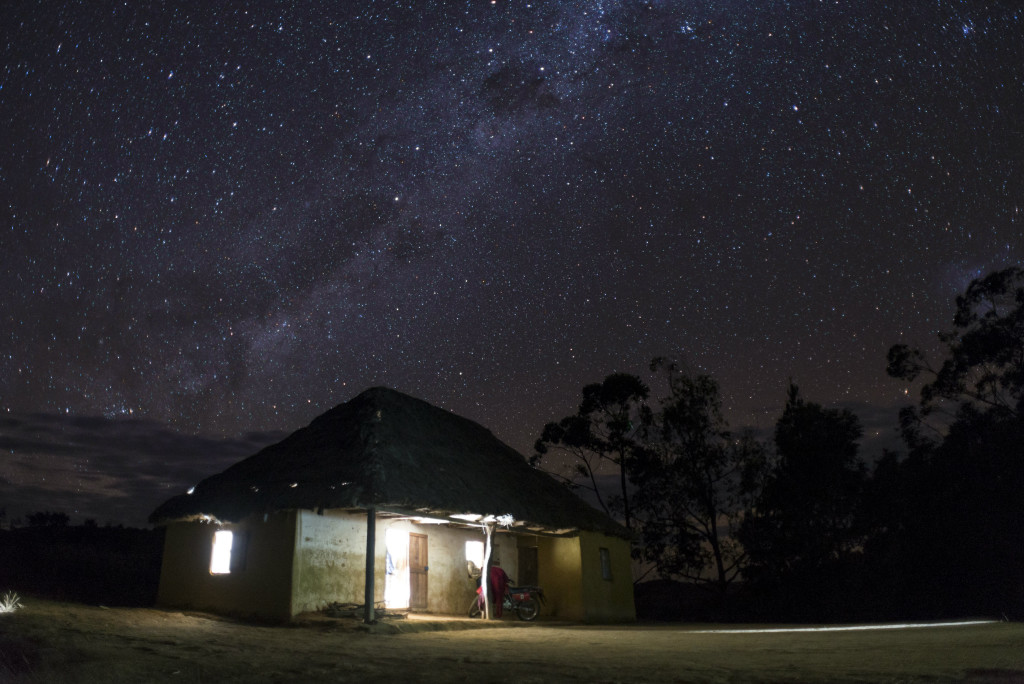 A house lit by solar energy under the starry skies of Madagascar
A house lit by solar energy under the starry skies of Madagascar Seven Malagasy grandmothers have been trained as solar engineers in India, thus helping to prevent logging for firewood and reducing destructive slash and burn activity. And they are finally learning to read.
Written by Martina Lippuner / Photos by Louise Jasper
Lydia carefully slides the wire into the solar lamp and applies the hot tip of the soldering iron to the connection. The 45-year-old grandmother then replaces the tool on its stand and looks up over her reading glasses: “Three years ago, I didn’t know where India was or what solar energy meant,” she confides.
Lydia is from Iavomanitra, a village of 240 houses located in the central uplands of Madagascar. It is one of the last biodiversity hotspots on the planet and WWF has been at work here for ten years; Madagascar’s tropical rainforests, the habitat of lemurs and chameleons found nowhere else on earth, reach right to the gates of the village. Unfortunately, areas of woodland have been cleared here, especially to make firewood, so providing access to clean and renewable energy sources is essential if the forest is to be preserved.
Seven Malagasy grandmothers trained as solar engineers have become symbols of a better future. Click To TweetWWF has been coming up with innovative ideas to help Madagascar, and its “solar grandmothers” are just one example. Lydia and six of her friends were the first Malagasy to qualify as solar engineers without gaining a high-school diploma. They all have grandchildren and not one of them knows how to read or write.
Clutching their brand-new passports, the women boarded a plane for India at the beginning of 2013 to spend six months undergoing a practical training course in solar technology at the Barefoot College, Tilonia, in the state of Rajasthan.
HELP YOURSELF
“Barefoot College”, which is financed by the Indian state, aims to allow the poorest among the population to find a better future for their village themselves. The principle is simple: training is provided for those that are most impoverished and deprived of rights in a village, and these are often women. They thus learn to install and repair water pumps or simple solar systems without having to depend on outside aid. It is not always an easy job, but Bunker Roy, the founder of Barefoot College, quotes Gandhi: “First they ignore you, then they laugh at you, then they fight you, then you win.”
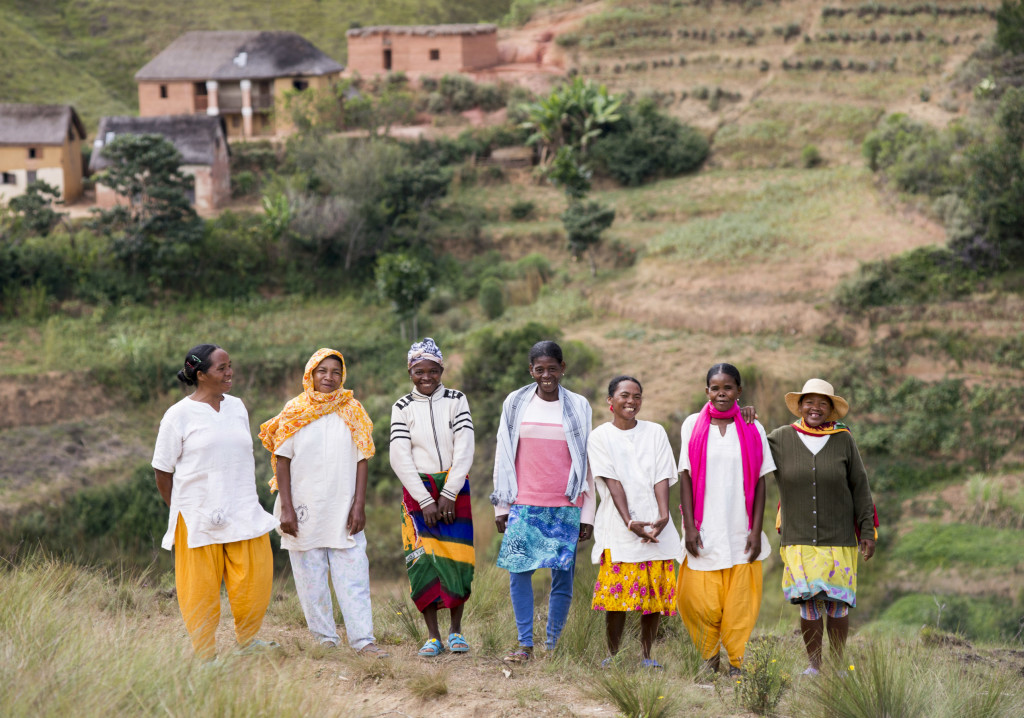 The seven “solar grandmothers”. They all already have grandchildren, and not one had ever left their home region before the journey to India.
The seven “solar grandmothers”. They all already have grandchildren, and not one had ever left their home region before the journey to India. Seven groups of women from various countries (including Colombia, the Comoros and Tanzania) also took part. Their families missed them terribly, but they were all aware it was a unique opportunity. Using sign language, puppet theatre, colour-coding and endless repetition, an instructor taught them everything they needed to know to bring electricity to their villages. It was here they learnt how to solder and install solar panels.
Having returned to the Great Island, their first job was to wait patiently – transported by bush taxi, 4×4, dugout canoe and on people’s backs, the crates of solar equipment supplied by the WWF were not to arrive in Iavomanitra for another six months. But once in possession of the necessary equipment, the “solar grandmothers” set to work without wasting another instant, installing batteries, voltage regulators and LED lights in every house. Only the solar panels had to be installed by others: “A roof is no place for women our age,” laughs Lydia. “We have men to whom we can give orders from ground level!”
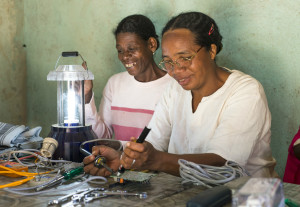 No need for a school education to electrify a village. Lydia (right) learnt her trade using sign language and through the medium of puppet theatre.
No need for a school education to electrify a village. Lydia (right) learnt her trade using sign language and through the medium of puppet theatre. And there was light…
Scarcely three months later, every household was electrified. “Iavomanitra has been transformed,” explains Voahirana Randriambola, coordinator of WWF Madagascar’s energy programme. “The positive impact of our work becomes apparent very swiftly.” Indeed, only three months ago, the village had gone to bed pretty much as soon as night fell, but now the evenings are buzzing with activity.
Seated around solar lamps, the women weave raffia mats that they will sell at the market, while the children jostle one another around the light sources as they do their homework – and a night school has opened its first course for adults at the community centre.
The school is Lydia’s pride and joy. She passed through her own school gates for the last time at the end of her second year of studies as her parents no longer had the means to pay for her tuition. Her children followed the same path, as she was unable to keep any of them at school for any length of time.
“I wanted my grandchildren to have more luck in life, that’s why I brought them light,” she says. “At my age, I’d never have thought I would still have a chance to learn to read and write at night school,” smiles Lydia, shaking her head incredulously.
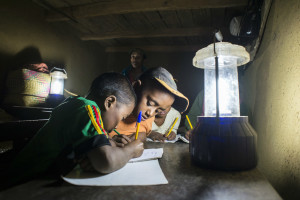 More time for homework – even though night has fallen, the children can carry on studying. Night classes have been organised for the adults.
More time for homework – even though night has fallen, the children can carry on studying. Night classes have been organised for the adults. Things have changed since these seven brave women chose to travel to foreign lands, where they don’t speak the language, to learn new skills and bring those talents back to improve the lives of their communities; people are coughing less since they stopped using oil lanterns at home, and firewood consumption appears to have fallen by half.
Their journey may just be beginning. After seeing the benefits that the grandmothers have brought to Iavomanitra and Tsaratanana, surrounding communities have expressed their desire to have access to solar energy. WWF is working on ways to support the seven solar engineers in bringing their knowledge, skills and passion to other villages, by having the women train others on the use and maintenance of solar portable lanterns.
A little while ago, a “solar grandmother” spoke in public at a local celebration, the first time a woman had addressed the community; the female guardians of the light have now become symbols of a better future.
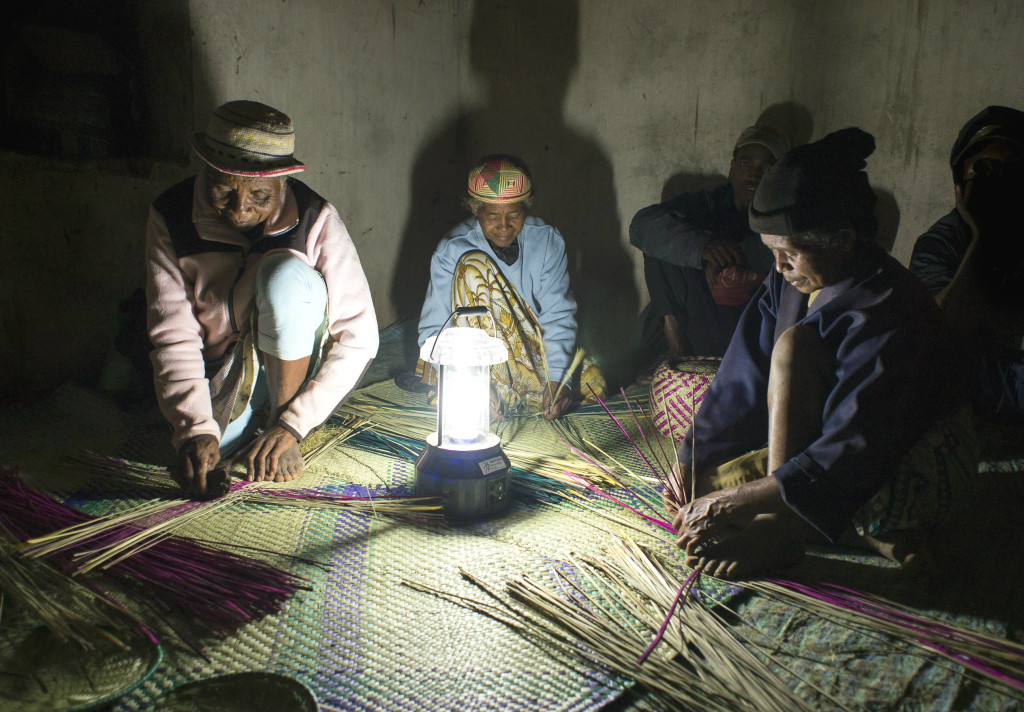 The solar lamps have made it possible to earn additional income. These women are weaving raffia mats in the evenings that they will then sell at the market.
The solar lamps have made it possible to earn additional income. These women are weaving raffia mats in the evenings that they will then sell at the market.
